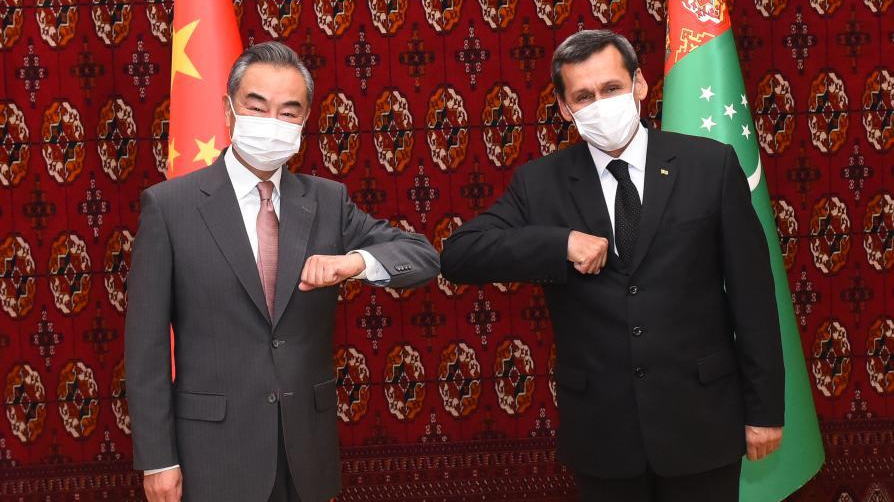
Visiting Chinese State Councilor and Foreign Minister Wang Yi (L) holds talks with Turkmen Deputy Prime Minister and Foreign Minister Rashid Meredov in Ashgabat, Turkmenistan, July 12, 2021. /Xinhua
Visiting Chinese State Councilor and Foreign Minister Wang Yi (L) holds talks with Turkmen Deputy Prime Minister and Foreign Minister Rashid Meredov in Ashgabat, Turkmenistan, July 12, 2021. /Xinhua
Editor's note: Hamzah Rifaat Hussain is a former visiting fellow at the Stimson Center in Washington and serves as assistant researcher at the Islamabad Policy Research Institute (IPRI) in Pakistan. The article reflects the author's opinions and not necessarily the views of CGTN.
Reliable bilateral strategic partnerships are critical for states to forge joint efforts towards addressing issues of internal and regional concern while simultaneously promoting deeper economic cooperation and people-to-people contacts. Foreign Minister Wang Yi's visit to Ashgabat in Turkmenistan as part of his Central Asia trip resulted in the solidification of the all-weather partnership between the two sides and underlined its potential to blossom while being anchored in neutrality, development orientation and collective views on regional security. The historical strength of the nearly 30-year-long relationship between Turkmenistan and China provides numerous opportunities for the region and plenty of room for optimism.
Both Ashgabat and Beijing agreed upon expanding regional resource bases in the pandemic era where economic stagnation can result in unemployment and pervasive poverty. The first priority is the resolution of the energy crisis in Turkmenistan, which has a dilapidating effect on productivity and industrialization with wider cooperation focused on processing oil and gas reserves in a country with tremendous deposits.
China has called for aligning the Belt and Road Initiative with the Digital Silk Road in Central Asia with the latter aimed at networking, cloud computing and establishment of smart cities, which has been met with considerable approbation. An understanding exists between both sides investments in e-commerce and digitalization of the Turkmen economy can result in widespread prosperity and allay economic woes through sound planning. These understandings have been reached in the presence of pernicious misinformation campaigns globally as hybrid warfare intensifies gives them added significance.
There was repeated emphasis in meetings between Chinese Foreign Minister Wang Yi and Turkmen Deputy Prime Minister Serdar Berdymukhamedov with Foreign Minister, Rashid Meredov on the promotion of all-round cooperation for tangible results which have a trickle-down effect on the respective populations in each of the five states in the region including Turkmenistan.
Noteworthy is the fact that Turkmenistan, like its neighboring countries, is a key country of a region defined by uncertainty and turmoil in Afghanistan and the alarming threat of terrorism knocking on Central Asian doors. In light of this, Foreign Minister Meredov lauded China's role and mentioned how joint cooperation against the three "evils" confronting the region, which are terrorism, separatism and extremism, will define future courses of action and opens up avenues for cooperation.
Turkmenistan's support for the "one country, two systems" policy exercised on Chinese territories is based on an understanding in Ashgabat that non-interference and non-alignment can prevent chaos and breakdowns in public order, which the region or the international community can ill afford.

A golden statue in Ashgabat, Turkmenistan. /Getty
A golden statue in Ashgabat, Turkmenistan. /Getty
Additionally, the establishment of the "Luban" workshop, a global program for technical personnel by China in the country, carries numerous opportunities of facilitating cultural exchange between the two sides as it embodies people-centric approaches towards development in line with economic, resource oriented and technological development for Turkmenistan.
For long, China has been unfairly demonized for development tilts in regions with allegations of neglecting local populations, but the relationship with Turkmenistan demonstrates that inclusivity is a guiding principle of cooperation and such narratives are nothing but mere fallacies.
Subjects such as biosecurity and tackling climate change by abiding by the central tenet Paris Climate Change Agreement of 2016 and facilitating communications to enable a trickle-down effect on local populations which would otherwise be vulnerable to predatory corporate practices resulting in widening income divides and destitution are part of strategic policymaking. All this has been made possible through amicable and unconditional ties, which have historical significance akin to the China/Turkmenistan relationship.
The receptivity of the Chinese narrative in Ashgabat underlines an understanding that Chinese sponsored development is targeted at achieving peace through empowerment in the absence of security arrangements agreements that imperil regional security.
The focus is purely on generating growth by exploring diverse sources of energy and technological development, which can usher in prosperity for the population of Turkmenistan. Given the unfolding regional dynamics and security quagmires, this visit and the nature of the bilateral ties are strategically and tactically significant.
Hence, Wang Yi's visit to Ashgabat is an affirmation that close bilateral ties can translate into joint visions for a peaceful and growth-oriented future.
(If you want to contribute and have specific expertise, please contact us at opinions@cgtn.com.)

